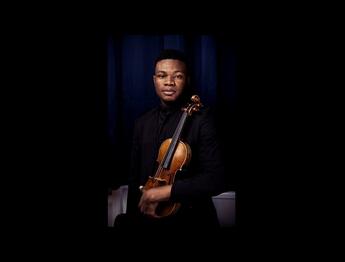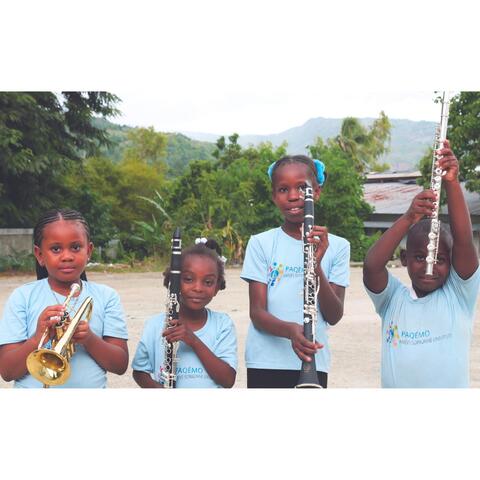
The PAQÉMO project: a passion for music in the service of education
On June 19, 2024, Sorbonne University student Jéricho Pierre-Noël was awarded the Grand Prix for Access to Culture by the Charles Defforey Foundation of the Institut de France

Jéricho Pierre-Noël co-founded the PAQÉMO project, which promotes access to music for young people in Haiti. PAQÉMO is support by AMEVS, a musical and educational association. This vocational project offers a means for them to meet, express themselves and rebuild their lives. He shares with us his commitment to musical education.
What is your educational background?
Jéricho Pierre-Noël: My career path began in Haiti, where I earned a double degree in management/economics and computer science. In 2021, I continued my studies in France, starting a degree in computer science at Sorbonne University. This year, I'm fully committed to a dual path: a Master's degree in musicology specializing in Music and Performing Arts Administration at Université Paris-Saclay and a Master's degree in research at Sorbonne University's Faculty of Arts and Humanities.
Why is music so important to you?
J. P.-N.: Music has always played a central role in my life, thanks to the influence of my grandmother, who introduced me to the art at a very early age. After the earthquake in Haiti on November 14, 2011, my grandmother gave me my first violin, a gesture that changed my life. This instrument, rare in my hometown, became the catalyst for my passion and my dreams. I played at many events, whether in church or in my music school orchestra. It was partly this passion for music that brought me to France, where I wanted not only to deepen my knowledge, but also to share and pass on this passion to others.
How does music help to promote education?
J. P.-N.: Music is a powerful vector for social cohesion and emotional expression. For me, helping people in need through music has a profound meaning. AMEVS, which I co-founded in 2022 with Sargine Any Melissa Bernard and Dimitri Weissenberg, a student at the Faculty of Science and Engineering, doesn't just support young people; it also contributes to the development of the whole community. Music, with its unifying power, is a formidable springboard for positive social transformation. Musical education enables young people to meet, express themselves and rebuild their lives, particularly in difficult contexts.
What role did Sorbonne University play in the creation of your association?
J. P.-N.: Sorbonne University played a key role in the creation and development of our association. Thanks to Pépite and the student life department, we were able to benefit from invaluable support. CVEC funding enabled us to launch our project. The student life service of the Faculty of Science and Engineering was by our side from the outset, supporting us in the elaboration of our strategy and throughout the development of PAQÉMO. The training courses offered by the student initiatives office and help in finding partnerships, were major assets for us.
What impact has the association had?
J. P.-N.: The impact of the association has been considerable. Music has created a real sense of fraternity and closeness between the members of the association. Beyond simple rehearsals, there was a real sharing of music and of what each member had to offer. Our concerts at Sorbonne University, notably the "Mardis en musique", held the first Tuesday of every month at the Atrium library, not only offered the university public a moment of relaxation, but also enabled them to discover the richness of Haitian musical culture. These events have also strengthened the bonds between students, creating a camaraderie that transcends academic boundaries. Seeing the Sorbonne University community's interest and sensitivity to education and culture touches me deeply. Through PAQÉMO, I'm convinced that every child touched by our project can become an agent of positive change in his or her community.
Describe the PAQÉMO project?
J. P.-N.: The PAQÉMO project (Projet Artistique de Quartiers et Éducatif Musical en Orchestre), aims to promote access to music for young people, by building an ecosystem where they can flourish through musical education. The project aims to strengthen Haiti's musical richness and offer children the opportunity to turn music into a professional activity while developing their musical culture. We organize weekly accompaniments for children who are often far removed from social life and leisure activities. This enables them to meet up, forge links and regain hope. For example, we organized a competition in Belladère to select the best children in the orchestra, and the winners will have the chance to come to Paris in April 2025 to perform in concert with our partners, in collaboration with Orchestre à l'École. This competition and the preparations for it have been made possible thanks to the funding we received this year from the university.

Crédits photo : Rosemitha Pimont
How did you react when you learned that you had won the Grand Prix for Access to Culture from the Charles Defforey Foundation of the Institut de France?
J. P.-N.: When the Institut de France contacted me to announce that I had won the prize, I was deeply moved. It's a collective victory that confirms the importance of the project we initiated with the association. This prize shows that, even when you're young and with a recent association, hard collective work can produce unexpected results. I was also surprised, because I didn't think our project could be recognized at such a high level. I'm extremely grateful to Sorbonne University for all the support it has given us, as well as to all our partners, who have placed their trust in us.
What are your next steps?
J. P.-N.: Thanks to the €100,000 award we received, we will be able to develop other orchestras in Haiti, potentially reaching over 2,000 children. We are currently planning a strategy to ensure the success of this deployment. We also hope that this prize will attract new partners in France and abroad. At our last Annual General Meeting, many students signed up, which is very encouraging. We are also working on new projects with professors from the Faculty of Arts and Humanities, such as concerts and exhibitions, which we hope to organize on several Sorbonne University campuses. We are also considering collaborations with Université Paris 8 and Université d'Évry Paris Saclay.
Looking back, what did your experience with the association bring you?
J. P.-N.: For me, it's essential to get involved in a cause. Getting involved in associative life, whether at Sorbonne University or elsewhere, enables us to develop professional, academic and social skills. This experience not only enriches our academic career, but also forges valuable skills such as collaboration, initiative and resilience, which will serve us well throughout our lives. My journey shows how important it is to receive support and benefit from an ecosystem like Sorbonne University. I would like to thank all those who contributed to our success, in particular the team at the Student Life Education Center, especially Rachel Fabre and Amine Jawhari, as well as the Pépite Sorbonne Université team, represented by Zonia Zegel and Axelle Ferraille. I would also like to thank my family, my partners in France and Haiti, and the Sorbonne University community for making this dream a reality.
